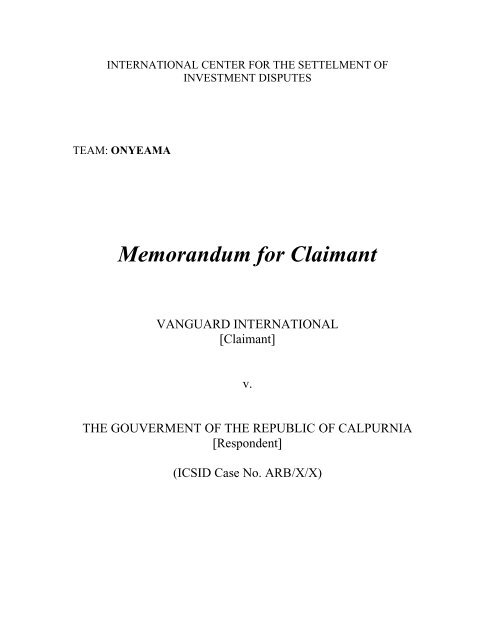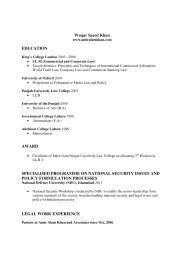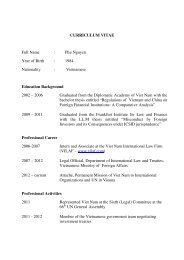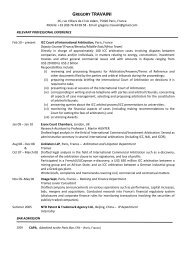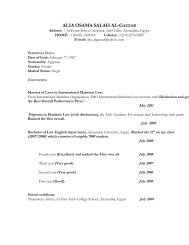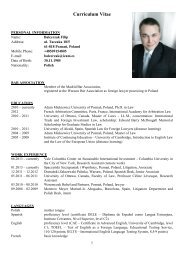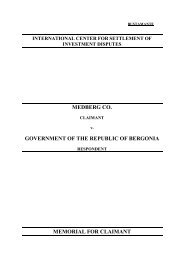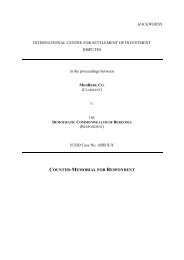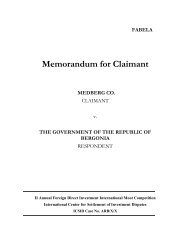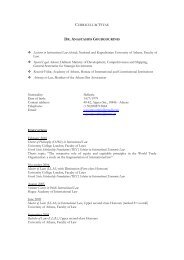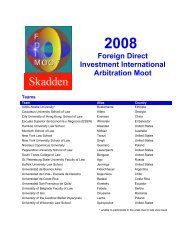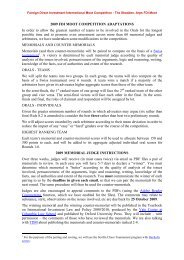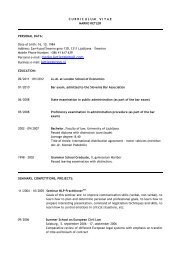Memorandum for Claimant - FDI Moot
Memorandum for Claimant - FDI Moot
Memorandum for Claimant - FDI Moot
You also want an ePaper? Increase the reach of your titles
YUMPU automatically turns print PDFs into web optimized ePapers that Google loves.
INTERNATIONAL CENTER FOR THE SETTELMENT OF<br />
INVESTMENT DISPUTES<br />
TEAM: ONYEAMA<br />
<strong>Memorandum</strong> <strong>for</strong> <strong>Claimant</strong><br />
VANGUARD INTERNATIONAL<br />
[<strong>Claimant</strong>]<br />
v.<br />
THE GOUVERMENT OF THE REPUBLIC OF CALPURNIA<br />
[Respondent]<br />
(ICSID Case No. ARB/X/X)
Table of Contents<br />
List of Authorities…………………………………………………………………….ii<br />
List of Legal Sources………………………………………………………………….iii<br />
Statement of facts ……………………………………………………………………...1<br />
Arguments<br />
The International Center <strong>for</strong> the Settlement of Investment Disputes is competent<br />
to decide its own competence………………..………………………………………..2<br />
The International Center <strong>for</strong> the Settlement of Investment Disputes has<br />
jurisdiction …………………………………………………………….………………2<br />
The dispute submitted to arbitration is legal………………….…………….……….4<br />
The dispute arises directly out of an investment……………………………………..7<br />
The dispute is arisen between Calpurnia, contracting State and Vanguard<br />
international, a juridical person of gaulois nationality………………………….......9<br />
Both parties to the dispute have given their consent to arbitration………………...9<br />
The <strong>Claimant</strong> attempted to resolve the dispute amicably, but was given no positive<br />
feedback……………………………………………………………………………….11<br />
The <strong>Claimant</strong> has not pursued any action be<strong>for</strong>e the domestic courts of Calpurnia<br />
that would jeopardize its access to ICSID.……………………………………..…...14<br />
Respondent has violated art. 2 of the Calpurnia – Gaul BIT, by unlawfully<br />
treating the <strong>Claimant</strong>’s investment and depriving it of the full protection and<br />
security conferred by the Treaty…………………………………………….............15<br />
Respondent has obstructed the transfer of the returns…………………………….18<br />
Discrimination………………………………………………………………………...19<br />
Expropriation ………………………………………………………………...............22<br />
ii
List of Authorities<br />
1. Scheurer, C. (2001). The ICSID Convention: A Commentary (Cambridge:<br />
Cambridge University Press)<br />
2. Bilateral Investment Treaties 1995-2005: Trends in Investment Rulemaking (New York and<br />
Geneva: United Nations), United Nations publication, Sales No. E.06.II.D.16. (2007).<br />
3. Charles Leben, La théorie du contrat d'état et l'évolution du droit international des<br />
investissements, Recueil des cours RCADI, 269 (1997)<br />
iii
List of Legal Sources<br />
1. Amco Asia Corporation and others v. Indonesia, ICSID Case No. ARB/81/1, Decision on<br />
Jurisdiction, 25 September 1983 (1 ICSID Reports 394); Award, 20 November 1984.<br />
2. American Manufacturing & Trading v. Zaire, ICSID Case No. ARB/93/1, Award, 21<br />
February 1997 (reprinted in 12, International Arbitration Reporter, 1997, No. 4, pp. A-1 to<br />
A-2).<br />
3. Azurix Corp. v. Argentina, ICSID Case No. ARB/01/12, Decision on Jurisdiction, 8<br />
December 2003; Final Award, 14 July 2006.<br />
4. Case concerning East Timor, International Court of Justice, 1995 ICJ Reports, 89.<br />
5. Case concerning the Barcelona Traction, Light and Power Company, Limited (Belgium v.<br />
Spain), 5 February 1970 (1970) International Court of Justice 3, at 35-36 (9 International<br />
Legal Materials 227).<br />
6. CMS Gas Transmission Company v. Argentine Republic, ICSID Case No. ARB/01/8,<br />
Decision on Jurisdiction, 17 July 2003; Award, 12 May 2005.<br />
7. Compañía de Desarrollo de Santa Elena S.A. v. Costa Rica, ICSID Case No. ARB/96/1,<br />
Award on the Merits, 17 February 2000.<br />
8. Enron and Ponderosa Assets v. Argentine Republic, ICSID Case No. ARB/01/3, Decision on<br />
Jurisdiction, 14 January 2004.<br />
9. GAMI Investments Inc. v. Mexico, UNCITRAL, Final Award, 15 November 2004.<br />
10. Loewen Group, Inc. and Raymond Loewen v. United States of America, ICSID Case No.<br />
ARB(AF)/98/3, Award on Jurisdiction, 5 January 2001; Award on Merits, 26 June 2003.<br />
11. Methanex v. United States, UNCITRAL, Decision on Amici Curiae, 15 January 2001;<br />
Preliminary Award on Jurisdiction and Admissibility, 7 August 2002; Final Award, 3 August<br />
2005.<br />
12. Tokois Tokelés v. Ukraine, ICSID Case No. ARB/02/18, Decision on Jurisdiction, 29 April<br />
2004; Dissenting Opinion, 29 April 2004.<br />
13. Vacuum Salt Products Limited v. Ghana, ICSID Case No. ARB/92/1, Award, 16 February<br />
1994 (reprinted in ICSID Review, 1994, vol. 9, 1, pp. 71–101/1994).<br />
14. Emilio Agustin Maffezini v. The Kingdom of Spain, ICSID Case No. ARB/97/7, Decision on<br />
Jurisdiction, 25 January 2000; Award, 13 November 2000; Rectification of Award, 31<br />
January 2001.<br />
iv
Statement of facts<br />
1. In 1997, Vanguard International, a leading GSM company having Gaulois<br />
nationality, together with SFCDC and several Calpurnian natural and juridical<br />
persons established a joint venture company named VanCal, with the seat in<br />
Innnocente de Irkoutsk, the capital of Calpurnia. VanCal is under the tutel and<br />
trademark of “Vanguard International”. <strong>Claimant</strong>’s shares fluctuated from an initial<br />
50% up to 86% in 2004. However, the shares were noted to decline as a result of<br />
share sales, <strong>Claimant</strong> currently owning 30% of shares 1% are owned by Ms.<br />
Francesca Pescara.<br />
2. SFCDC is 100% owned by the State of Calpurnia. With the ascension of the<br />
CCC in November 2003, Vanguard International as well as other <strong>for</strong>eign entities,<br />
including Gaulois, have suffered due to the climate of hostility generated by the<br />
CCC party’s new politics that advocate to the return to “traditional values of hard<br />
work, family, modesty, thrift and self-sufficiency”. In consequence, Calpurnia’s<br />
diplomatic relations have seriously deteriorated, amounting to unsubstantiated<br />
allegations of political and industrial espionage and destabilization.<br />
3. Starting in late 2003 SFCDC major VanCal stock holder implemented a series<br />
of decisions such as: not paying any cash dividends to <strong>for</strong>eign shareholders, ceasing<br />
the sharing of the accounts, financial statements or other in<strong>for</strong>mation to the Gaulois<br />
citizens as well as not translating such material in Gaulois.<br />
4. Furthermore it has been noted that the climate of hostility has <strong>for</strong>ced Gaulois<br />
expatriate personnel including Ms. Pescara and Mr. Kolowenko to leave Calpurnia<br />
in late 2004, finding it impossible to safely return after November 2004.<br />
5. The <strong>for</strong>ced absence of Ms. Pescara acting as VanCal managing director and<br />
Mr. Kolowenko chief technical officer severely diminished Vanguard<br />
International`s ability to preserve the value of its investment.<br />
6. The three police searches at the private homes of the two Gaulois nationals on<br />
7th December 2003, 3 June 2004 and 15 June 2004 were abusive, without any legal<br />
support conducted in the sole purpose of intimidating and excluding from<br />
Calpurnian social and economical life After this political change the situation in<br />
1
VanCal have almost radically changed. The biggest shareholder was SFCDC better<br />
said CCC. New decisions have been made and most import the exclusion of Pescara<br />
and Kolowenko <strong>for</strong>m the Board of Directors and the fact that the <strong>for</strong>eign<br />
shareholders are not paid <strong>for</strong> its “returns”<br />
7. Once the time passed out almost the whole company of VanCal was in the<br />
propriety of Gaul Government because with various actions the have excluded<br />
Pescara and Kolowenko by not according business visa and various picketing and<br />
home searches.<br />
The International Center <strong>for</strong> the Settlement of Investment Disputes is competent to<br />
decide its own competence<br />
8. Art. 41 of the ICSID Convention provides that the Tribunal shall be the<br />
judge of its own competence, and any objection by a party to the dispute that the<br />
dispute is not within the jurisdiction of the Center, or <strong>for</strong> the other reasons is not<br />
within the competence of the tribunal, shall be considered by the Tribunal. Art. 41<br />
does not state what are the applicable law rule <strong>for</strong> the determination of the<br />
Tribunal’s competence over the dispute as opposed to those applicable to the<br />
dispute itself.<br />
The International Center <strong>for</strong> the Settlement of Investment Disputes has jurisdiction<br />
9. In the jurisdictional phase of the proceedings, the tribunal only has to<br />
determine if the claims, as <strong>for</strong>mulated, as long as they are not frivolous or abusive,<br />
fit into the jurisdictional frame drawn by the relevant treaty instrument . In this<br />
phase the tribunal deals with the the nature of claims or contentions and not with<br />
their well-founded ness 1 .<br />
1 El Paso Energy International Company v. The Argentine Republic, p. 16, par. 45<br />
2
10. As the parties have not chosen the applicable law to the dispute under art,<br />
42(1) of the Convention, the law applicable to this dispute is international law<br />
because the BIT is itself the governing law as lex specialis between the parties and<br />
it expressly requires Calpurnia to comply with international law.<br />
11. The jurisdiction of the Center is to be determined by applying art. 25 of the<br />
Convention. In addition, the competence of the Tribunal is governed by the terms of<br />
the instrument expressing the parties consent to ICSID arbitration, in our case the<br />
Calpurnia – Gaul BIT. Sharing the conclusion reached in Azurix, we are of view<br />
that reaching a determination on jurisdiction requires the applicability of art. 25 of<br />
the ICSID Convention, as well as the terms of the Calpurnia - Gaul BIT Treaty. On<br />
the other hand, art. 42(1) of the Convention, which calls <strong>for</strong> the application of<br />
domestic legislation and international law only applies to the merits of the dispute.<br />
12. There<strong>for</strong>e, in order to establish whether the ICSID has jurisdiction in<br />
arbitrating the matter at hand, we would have to examine the provisions of art. 25 of<br />
the Convention and those of art. 11 of the Calpurnia- Gaul BIT.<br />
13. Art. 25 ICSID states that:<br />
(1) The jurisdiction of the Centre shall extend to any legal dispute arising<br />
directly out of an investment, between a Contracting State(or any constituent<br />
subdivision or agency of a Contracting State designated to the Centre by that State)<br />
and a national of another Contracting State, which the parties to the dispute consent<br />
in writing to submit to the Centre. When the parties have given their consent, no<br />
party may withdraw its consent unilaterally.<br />
(2) “National of another Contracting State” means:<br />
14. (b) any juridical person which had the nationality of a Contracting State other<br />
than the State party to the dispute on the date on which the parties consented to<br />
submit such dispute to conciliation or arbitration (in our case this is the de facto<br />
situation) and any juridical person which had the nationality of the Contracting<br />
State party to the dispute on that date and which, because of <strong>for</strong>eign control, the<br />
3
parties have agreed should be treated as a national of another Contracting State <strong>for</strong><br />
the purposes of this Convention.<br />
15. We will proceed to demonstrate that this Tribunal has indeed jurisdiction, with<br />
the following arguments: the dispute is of a legal nature, has arisen directly out of<br />
the investment and is between a Contracting State and a national of another<br />
Contracting State. Furthermore, we will demonstrate the existence of the consent to<br />
arbitration. Moreover, as a response to Respondent’s objections to arbitration, we<br />
will show that there is no impediment <strong>for</strong> arbitration, the <strong>Claimant</strong> having complied<br />
with all the requirements in the Treaty.<br />
The dispute submitted to arbitration is legal<br />
16. The dispute shall be considered legal if there are claims of restitution or<br />
damages arisen out of the violation of a previous contract, national legislation or<br />
international law. The claimant invokes a breach by Calpurnia of the obligations<br />
owed by it to Vanguard International under the Calpurnia- Gaul BIT. Namely, the<br />
claimant submits that the Calpurnia has discriminated and unlawfully interfered wit<br />
the <strong>Claimant</strong>’s investment in VanCal, obstructed the transfer of returns from the<br />
<strong>Claimant</strong>’s investment, namely the cash dividends and payment of royalties, and<br />
failed to provide the <strong>Claimant</strong> and it’s investment full protection and security<br />
guaranteed under the Calpurnia – Gaul BIT. All the above mentioned measures and<br />
omissions, in the <strong>Claimant</strong>’s view, amount to an expropriation of Vanguard<br />
International’s Investment in VanCal.<br />
17. A legal dispute is, in the words of the Report of the Executive Directors of<br />
the World Bank on the Convention, one that concerns “ the existence or scope<br />
of a legal right or obligation, or the nature or extent of the reparation to be<br />
made <strong>for</strong> breach of a legal obligation, and is more that a mere ‘conflict of<br />
interest’” 2 .<br />
2 Azurix Case , p 31, para. 59<br />
4
18. Furthermore, <strong>Claimant</strong> recalls the definition given by Prof. Schreuer that<br />
provides that a dispute is legal if “ legal remedies such as remedies such as<br />
restitution or damages are sought and if legal rights based on, <strong>for</strong> example,<br />
treaties or legislation are claimed.” 3 . Given the fact that <strong>Claimant</strong> is invoking<br />
the violation of Calpurnia’s obligations under the Treaty and seeks just<br />
compensation <strong>for</strong> expropriation, the dispute has unequivocally a legal nature.<br />
Noting that the definitions of the term ‘legal’ are not uni<strong>for</strong>m, the <strong>Claimant</strong><br />
would like to point out the definition accepted by the Permanent Court of<br />
International Justice in the Mavrommatis case(Greece v. Great Britain) 4 ,<br />
where the court said that a “ dispute is a disagreement on a point of law or<br />
fact, a conflict of legal views between two persons” The above mentioned<br />
definition was recently confirmed in the East Timor Case and it covers all<br />
types of disputes. In order <strong>for</strong> a dispute to qualify as legal, the dispute has to<br />
be a controversy in which the Parties are in disagreement over a right. In our<br />
case, it is the right to just and rapid compensation that is in question.<br />
19. In order to determine if a dispute is legal pursuant to art. 25 of the<br />
Convention, the Tribunal has to determine whether the parties have justified<br />
their claims by relying on the law and whether legal remedies are being<br />
sought. As shown above, the <strong>Claimant</strong>’s request is founded on the violation of<br />
Calpurnia’s obligations under the BIT. Clearly, the juridical controversy is<br />
treaty related. The BIT is supposed to promote and ensure the security and<br />
lawful treatment of investments and investors, and the measures taken by the<br />
Government of Calpurnia, using the cover of SFCDC as major shareholder in<br />
VanCal clearly and severely obstruct Vanguard’s rights conferred by the<br />
treaty as well as those arisen out of the contract.<br />
20. Even if Respondent would state the fact that the dispute is merely<br />
contractual, the <strong>Claimant</strong> is of view that, even if some contractual rights are<br />
being violated by VanCal (no royalties have been paid to Vanguard<br />
3 Ch. Schreuer, The ICSID Convention: A Commentary, Cambridge, Cambridge<br />
University Press, 2001, p. 105<br />
4<br />
Judgement of August 30 th 1924, PCJI, Series A, No.2<br />
5
International despite the fact that VanCal continues on using the Vanguard<br />
Trade Mark), the dispute is treaty related, as the contractual violation is only a<br />
small part of the dispute. Furthermore, in that respect, <strong>Claimant</strong> would like to<br />
submit to this tribunal that the measures taken by SFCDC, as controlling<br />
shareholders in VanCal, are taken in the name of the State of Calpurnia. To<br />
sustain this allegation, the <strong>Claimant</strong> would like to remind the Tribunal that<br />
there is evidence that Dr. Swift, a representative of the SFCDC, during the<br />
board meeting held on the 15 th November 2004, observed that the SFCDC,<br />
implicitly the Government of the State of Calpunia did not “regard VanCal as<br />
really being a private company.”. Moreover, the same Dr. Swift at the<br />
shareholders meeting held on the 16 th of November 2005, after voting Ms.<br />
Pescara off the board, states that the “main objective[of the company] is ….<br />
To protect the interests of the country as well as to preserve the industry and<br />
the interests of all shareholders including the minor ones within the<br />
framework of the general interests of the country; and the Board of Directors<br />
has done all in its powers to achieve this end. Indeed, as we will show in the<br />
second section of the memorandum, the Board of Directors, exclusively<br />
<strong>for</strong>med out of Calpurnian nationals and SFCDC representatives, has done all<br />
in its powers to expropriate the <strong>Claimant</strong>’s investment by obstructing the<br />
return of the owed dividends, by ceasing all transfer of in<strong>for</strong>mation or<br />
collaboration between VanCal and Gaulois national, that have been refered to<br />
as “Gaulois spies.”<br />
21. The dispute is of legal nature since it refers to a violation of the<br />
obligations contained in the Calpurnia-Gaul BIT and the corresponding<br />
compensation.<br />
6
The dispute arises directly out of an investment<br />
22. The term investment benefits from a broad interpretation from the arbitral<br />
tribunal 5 .<br />
23. In the case law of the ICSID mechanism have been accepted as investments<br />
that determined the legal base of the tribunal, several different <strong>for</strong>ms of contracts<br />
e.g : a contract having as object the construction of a highway 6 , the existence of a<br />
loan 7 , a license giving the right to the beneficial company to import goods 8 or even<br />
the possibility of access to a national market 9 .<br />
24. In accordance with the Art. 1.1 of the Calpurnia-Gaul BIT, the term<br />
investment has a broad definition:<br />
25. “ 1. The term “ Investment” means every kind of asset established or acquired<br />
by an investor of one Contracting Party in the territory of other Contracting Party<br />
in accordance with the laws and regulations of the Latter Contracting Party<br />
including, in particular:<br />
i.(…) b) shares, stocks, debentures or other <strong>for</strong>m of participation in a company;(…)<br />
26. d) intellectual property rights, such as (…) trade marks (…) know –how and<br />
good will(…)”<br />
27. Given the wide meaning conferred upon this term in the BIT, a joint venture<br />
contract qualifies as an investment. As the Tribunal itself indicated in Azurix, broad<br />
definitions of this kind are intended to facilitate agreement between the parties as to<br />
prevent the corporate personality from interfering with the protection of the real<br />
interests associated with the investment. The definition of investment clearly<br />
includes majority shareholders, but also minority or indirect shareholders, whether<br />
or not the latter control the company. As explained in the Goetz case, the authority<br />
5<br />
Charles Leben, La théorie du contrat d'état et l'évolution du droit international des<br />
investissements, Recueil des cours RCADI, 269 (1997), p. 245<br />
6<br />
Salini Case, 2001<br />
7<br />
CSOB v. Slovaquie, 24 May 1999<br />
8<br />
Middle East Cement Shipping, v. Egypte, 12 Avril 2002<br />
9<br />
Pope and Talbot v. Canada, 26 January 2000<br />
7
to bring action granted to shareholders by the BIT seeks protection <strong>for</strong> the real<br />
investors. A similar conclusion has been reached in CMS and Enron( Additional<br />
Claim). Vanguard International owns 30% of the VanCal shares.<br />
28. Vanguard International’s investment falls under the definition given by art.<br />
1.1 of the Calpurnia . the claimant own 30% shares of VanCal(1.1(b), the Vanguard<br />
International trade mark given under license to VanCal, know- how and technical<br />
assistance provided in view of separate agreements between the joint venture<br />
parties. The harm and losses suffered by the claimant amount to a violation of the<br />
BIT’s guarantees.<br />
29. Moreover, Vanguard International complies with the requirements of the term<br />
‘investor’, in accordance with art. 1.3 of the BIT, that provides as follows in para.<br />
(b):’ any legal person such as company, corporation, firm, business association,<br />
institution or other entity constituted in accordance with the laws and regulation of<br />
the Contracting Party and having its seat within the territory of the Contracting<br />
Party.” Vanguard International is a Gaulois company specialized in mobile<br />
telecommunications with GSM operations and has its seat in Nova Parigi, capital of<br />
the Federal States of Gaul. There<strong>for</strong>e, the <strong>Claimant</strong> has jus standi according to<br />
both the BIT and the Convention.<br />
30. The plea originates in the violation of the provisions of the Treaty,<br />
independently from domestic law or from contractual obligations. Even if it were<br />
considered to be a violation of the contractual obligation arisen out of the joint<br />
venture and license contracts, these violations amount to an infringement of the<br />
guarantees of the treaty. Taking into consideration this criterion, the choice of a<br />
national/local <strong>for</strong>um <strong>for</strong> contractual clams is considered compatible with the<br />
election of arbitration <strong>for</strong> purposes of the treaty. There<strong>for</strong>e, even if the <strong>Claimant</strong> had<br />
pursued legal action be<strong>for</strong>e the domestic courts of Calpurnia, it would still have jus<br />
standi be<strong>for</strong>e ICSID, regarding matters related to the BIT. However, as we will<br />
further demonstrate, there has been no prior submission of the dispute to the<br />
domestic courts of Calpurnia.<br />
8
The dispute is arisen between Calpurnia, contracting State and Vanguard<br />
international, a juridical person of Gaulois nationality<br />
31. The <strong>Claimant</strong> is of Gaulois nationality, being a company incorporated in the<br />
Federal States of Gaul (the Convention came into <strong>for</strong>ce in respect of the Federal<br />
States of Gaul long be<strong>for</strong>e the investment dispute arose 10 ). There<strong>for</strong>e, it is<br />
understood that Vanguard International, by having the nationality of a Contracting<br />
State other than the one party to the dispute, is able to petition ICSID on the basis of<br />
its nationality. The Respondent, the State Calpurnia is also a party to the ICSID<br />
Convention.<br />
Both parties to the dispute have given their consent to arbitration<br />
32. The BIT embodies the expression of consent <strong>for</strong> resorting to arbitration should<br />
a dispute arise between the investor and the State with respect to the guarantees<br />
ensured under the Treaty. The Treaty is self sufficient <strong>for</strong> this purpose and the<br />
option of resorting to arbitration is solely exercised by the <strong>Claimant</strong> by the simple<br />
fact of expressing its own consent.<br />
33. The Convention requires consent in writing from both parties to the<br />
dispute. The ICSID Convention does not stipulate a specific <strong>for</strong>m that written must<br />
take. It requires only the written <strong>for</strong>m, without specifying the exact <strong>for</strong>m that the<br />
written consent must take nor to whom it must be addressed to and sent to. Both the<br />
expression of the consent in a request <strong>for</strong> arbitration or in a separate <strong>for</strong>m from the<br />
request itself 11 can validly open the way to ICSID’s arbitration..<br />
(1) Just as in the case of legislative provisions <strong>for</strong> the settlement of disputes<br />
by the ICSID, a provision on consent in the BIT Calpurnia Gaul can be no more<br />
than a simple offer that requires acceptance. The BIT provision cannot replace the<br />
10 1 st Round of Clarifications<br />
11 Tokios Tokeles v. Ukraine, Decision on Jurisidiction, Case No ARB/02/18, paras.<br />
97-98<br />
9
12<br />
investors consent. The requirements in this case are fulfilled, the BIT also being<br />
between the host country and the State of the Investor’s nationality.<br />
34. In AMT vs. Zaire, the Tribunal said:<br />
35. In the present case, it happens that AMT(…) has opted <strong>for</strong> a proceeding<br />
be<strong>for</strong>e ICSID. AMT has expressed its choice without any equivocation; this<br />
willingness together with that of Zaire expressed in the treaty, creates that consent<br />
necessary to validate this assumption to jurisdiction by the Centre.”<br />
36. Art. 11.3 of the Calpurnia – Gaul BIT embodies the consent of the parties<br />
to the BIT – Calpurnia and the Federal States of Gaul – to the submission of any<br />
investment dispute to binding arbitration in accordance with the choice of a national<br />
in question, and further provides that such consent satisfies the requirement <strong>for</strong><br />
written consent <strong>for</strong> the purposes of Chapter II of the Convention. Calpurnia and<br />
Gaul signed the ICSID Convention, entering into <strong>for</strong>ce long be<strong>for</strong>e the dispute<br />
arose.<br />
37. Furthermore, the open invitation provided by the parties to the BIT to<br />
investors to settle their claims, inter alia, through arbitration be<strong>for</strong>e ICSID tribunals,<br />
has been taken up by the <strong>Claimant</strong> by it letter containing the request <strong>for</strong> arbitration,<br />
dated July 31 st 2007 to the Secretary General of the Center consenting arbitration 12 .<br />
38. Furthermore, as shown above, the filling of the request <strong>for</strong> arbitration is by<br />
itself a sufficient proof of the <strong>Claimant</strong>’s consent. There<strong>for</strong>e, we must conclude that<br />
both an offer to arbitration, contained in art. 11.3 of the Calpurnia- Gaul BIT, as<br />
well as a valid and unequivocal acceptance of such offer, namely the request <strong>for</strong><br />
Art. 68.2 : (2) This Convention shall enter into <strong>for</strong>ce 30 days after the date of<br />
deposit of the twentieth instrument of ratification, acceptance or approval. It shall enter<br />
into <strong>for</strong>ce <strong>for</strong> each State which subsequently deposits its instrument of ratification,<br />
acceptance or approval 30 days after the date of such deposit.<br />
and 71: Any Contracting State may denounce this Convention by written notice<br />
to the depositary of this Convention. The denunciation shall take effect six months after<br />
receipt of such notice.<br />
10
arbitration exist; <strong>for</strong> the above mentioned reasons, we must conclude that both<br />
parties to the dispute have consented to ICSID jurisdiction.<br />
39. The consent, once perfected, is binding <strong>for</strong> both parties, has an irrevocable<br />
character, which may not be object to a unilateral denunciation.<br />
40. Consent agreements are to be interpreted neither restrictively nor<br />
extensively but in accordance with good faith and with the object and purpose of<br />
the ICSID Convention, stated in Art. 31.1 of the Vienna Convention on the law of<br />
treaties (VCLT). The relevant provision notes that “A Treaty shall be interpreted in<br />
good faith in accordance with the ordinary meaning to be given to the terms of the<br />
Treaty in their context and in the light of its object and purpose”. The purpose of the<br />
Treaty is that of encouraging and protecting investments and the ICSID mechanism<br />
was designed to facilitate the settlement of disputes between States and <strong>for</strong>eign<br />
investors. 13<br />
The <strong>Claimant</strong> attempted to resolve the dispute amicably, but was given no<br />
positive feedback<br />
41. Under Art. 11 para. 2 of the Calpurnia – Gaul BIT the parties to the<br />
dispute should initially seek a resolution of the dispute through consultation and<br />
negotiation and the national concerned may have recourse to arbitration, inter alia,<br />
only after 18 months from the date that the dispute arose. The <strong>Claimant</strong> delivered<br />
notice of the existence of an investment dispute under the Calpurnia – Gaul BIT on<br />
5 th February 2007 14 , the notification having been made in writing and addressed to<br />
Mr. Poe, a member of the board of directors of VanCal at that respective time.<br />
42. The letter claimed compensation due to the de facto expropriation by state<br />
entities and severe violations of their international obligations under the BIT and<br />
general international law. The Respondent’s letter dated 21 st February 2007 came<br />
as an answer to the <strong>Claimant</strong>’s notification, strongly declining any governmental<br />
implication in the matter, stating that it was merely an internal contractual dispute.<br />
In view of the fact that Mr. Poe, acting both as a member of VanCal’s board of<br />
13 Report of the Executive Directors, para. 9<br />
14 Calendar of events<br />
11
directors as well as a representative of SFCDC, implicitly the Government has<br />
given no avenue of amicable conciliation, the <strong>Claimant</strong> has intended to resolve the<br />
dispute in an amicable way but has failed.<br />
43. The objections <strong>for</strong>mulated concerning this aspect by the Respondent have<br />
no legal base. The <strong>Claimant</strong> is not denying that the BIT stipulates a term in which<br />
amicable resolution should be tried, and the <strong>Claimant</strong> commenced procedures of<br />
resolving the dispute but no effect due to the Respondent negative attitude towards<br />
the request.<br />
44. For the BITS, related to the principle of no-discrimination obligation and<br />
equal treatment is the MFN clause. According to this principle, the host state must<br />
provide a covered <strong>for</strong>eign investor with the highest standard of treatment available<br />
to an investor from any other <strong>for</strong>eign State. In our case, in respect of this clause,<br />
Art. 7 <strong>for</strong>m the Calpurnia-Flatland BIT that only requires a two month period of<br />
consultations and negotiation prior to pursuing the legal matter be<strong>for</strong>e the ICSID.<br />
Applies.<br />
45. The <strong>Claimant</strong> invokes the most favored nation clause to claim the benefit<br />
of the lesser period of amicable resolution be<strong>for</strong>e pursuing remedies through<br />
arbitration. The most favored nation clause is provided <strong>for</strong> by art. 4 of the Calpurnia<br />
Gaul BIT. The provisions allow the <strong>Claimant</strong> to benefit the same treatment as the<br />
one provided <strong>for</strong> <strong>for</strong>eign investors in the Calpurnia – Flatland BIT, there<strong>for</strong>e it is<br />
only obliged to respect the 2 months period of negotiation be<strong>for</strong>e filling the request<br />
<strong>for</strong> arbitration. This allows the claimant to have recourse to ICSID arbitration<br />
without the need of consultations and not 18 months.<br />
46. Even if Flatland expressed the denunciation of the ICSID Convention, on<br />
2 May 2033, be<strong>for</strong>e the dispute crystallized, in present the Flatland-Calpurnia BIT<br />
remains in <strong>for</strong>ce, so all the dispositions of the treaty have binding <strong>for</strong>ce between the<br />
Contracting States. The ICSID Convention is a general framework of the rules<br />
applying in the domain of <strong>for</strong>eign investments and the BITs are lex specialis in this<br />
matter. The states have a wide discretion in regulating by bilateral agreements the<br />
regime of <strong>for</strong>eign investments. As long as none of the Contracting States to<br />
12
Flatland-Calpurnia BIT has not denunciated in writing the treaty, his provisions<br />
remain in <strong>for</strong>ce <strong>for</strong> the parties and produce legal consequences.<br />
47. Moreover, the investor is entitled to invoke against the State the wider<br />
resolution clause 15 , which is contained, in our case in the Flatland- Calpurnia BIT.<br />
As a general rule, MFN provisions in a BIT should be understood to apply to<br />
dispute settlement unless clearly appears otherwise 16 . In our case, there are no<br />
reasons to conduct to such a conclusion and a presumption in this sense can not be<br />
applicable.<br />
48. The MFN Clause has as effect to broaden the scope of investor's<br />
procedural and substantive rights beyond those in the original agreement under<br />
which he claims protection as the arbitral tribunal stated in the Maffezzini Case. 17<br />
49. There are no dispositions in the text of Calpurnia-Gaul BIT that limit the<br />
scope of application of the MFN clause. Under the rules of interpretation contained<br />
in Vienna Convention, (restrictive interpretation), the Respondent can not sustain<br />
that<br />
50. The MFN clause must not extend to dispute settlement matters, in lack<br />
explicit provision included in the text of the treaty.<br />
51. The broad interpretation of the Maffezzini Case was used also in the<br />
Siemens Case 18 , where the tribunal stated that the access to the dispute settlement<br />
mechanisms is a part of the protection offered under the treaty and a part of the<br />
treatment of <strong>for</strong>eign investors and investments and of the advantages accessible<br />
through a MFN clause.<br />
15 Maffezzini Case, p. 47, para. 86<br />
16<br />
Gas Natural Case, Telenor p, 48, nota 32,<br />
17<br />
Maffezzini v. Spain<br />
18<br />
Siemens Case<br />
13
The <strong>Claimant</strong> has not pursued any action be<strong>for</strong>e the domestic courts of<br />
Calpurnia that would jeopardize its access to ICSID<br />
52. The Calpurnia-Gaul BIT is a treaty related dispute there<strong>for</strong>e the ICSID has<br />
jurisdiction, as it is in connection with the standards of protection set by the BIT (<br />
see 31 same case).<br />
53. <strong>Claimant</strong> does not sustain that no actions were promoted be<strong>for</strong>e the<br />
domestic courts, but these actions have no connection with the request <strong>for</strong><br />
arbitration <strong>for</strong>mulated.<br />
54. Respondent sustains that due to this actions, the tribunal lacks jurisdiction,<br />
opinion which can not be received by the tribunal, fro the reasons that follow.<br />
55. Firstly, there is no identity between the parties in the two distinct<br />
procedures. The actions be<strong>for</strong>e the domestic courts were not <strong>for</strong>mulated by the<br />
<strong>Claimant</strong> in aour procedure, Vanguard International.<br />
56. In one action, <strong>Claimant</strong> was Ms Pescara, who made an application to the<br />
Commercial Court of San Innocente de Irkoust to order Van Cal to transfer to her<br />
account in Gaul dividends on 1% holdings. The application was dismissed on 14<br />
June 2006 <strong>for</strong> lack of standing to bring this action. 19 .<br />
57. The other action presented be<strong>for</strong>e the national courts was the application<br />
<strong>for</strong>mulated by Vanguard International addressed to the Constitutional Court in order<br />
to declare unlawful the December 2003, April 21004, April 2004 and July 2004<br />
searches and to obtain compensation. These actions were also dismissed 20 .<br />
58. We can easily observe that there is no identity between the parties in the<br />
procedures nor identity of claims<br />
19 <strong>Moot</strong> Problem, p. 9<br />
20 <strong>Moot</strong> Problem, para. 17, p. 4<br />
14
Merits<br />
59. The <strong>Claimant</strong> will further on demonstrate that the Respondent has<br />
discriminated Vanguard International, unlawfully interfered in the <strong>Claimant</strong>’s<br />
investment, obstructed the transfer of returns from the <strong>Claimant</strong>’s investment and<br />
failed to provide the <strong>Claimant</strong> and its investment full protection and security<br />
contrary to the treaties referred to above and international law, and through these<br />
acts and omissions has expropriated <strong>Claimant</strong>’s investment.<br />
Respondent has violated art. 2 of the Calpurnia – Gaul BIT, by unlawfully<br />
treating the <strong>Claimant</strong>’s investment and depriving it of the full protection and<br />
security conferred by the Treaty.<br />
60. The political climate in Calpurnia has changed in the moment the CCC<br />
gained power in the Parliament, on November 2003; this actual date is also the<br />
moment when the <strong>Claimant</strong>’s investment and it’s enjoyment started to decline.<br />
Starting November 2003, it has been noted that the political and social climate in<br />
Calpurnia is hostile toward non-nationals, either natural of legal persons.<br />
Calpurnia’s political leaders’ new philosophy is one based on traditionalism,<br />
nationality, protection of Calpurnian values and lesser and lesser does it respect the<br />
diplomatic agreements or international treaties. More particularly, each Contracting<br />
Party shall accord to such investments treatment which in any case shall not be less<br />
favorable than that accorded either to the investments of its own nationals or to<br />
investments of any third State, whichever is more favorable to the national<br />
concerned. Discriminatory measures include those which are discriminatory in<br />
effect as well as those that are intentionally discriminatory 21 .<br />
61. The promotion and in protection of the investment is guaranteed by art,2<br />
of the Calpurnia – Gaul BIT. According to the above mentioned article, Calpurnia is<br />
21 K. J. Vandevelde, United States Investment Treaties. Policy and Practice, 1992, pp.<br />
117-120<br />
15
supposed to encourage and create favorable conditions in its territory <strong>for</strong><br />
investments by investors of the other Contracting Party, there<strong>for</strong>e the Federal States<br />
of Gaul, and in exercise of the powers conferred by its laws shall admit such<br />
investment. Vanguard International’s investment has been admitted, the result being<br />
VanCal, the joint venture company. Once perfected such investment, there<strong>for</strong>e<br />
starting with 1997, Calpurnia, in accordance with art. 2.2 of the BIT, should, at all<br />
times, accord the <strong>Claimant</strong>’s investment fair and equitable treatment and full and<br />
constant protection and security. Bearing in mind that all the actions were<br />
per<strong>for</strong>med by representatives of SFCDC after the change of political regime, and<br />
that in the period immediately following the change of political orientation, Gaulois<br />
citizens were house- searched without any legal ground whatsoever, we are of view<br />
that the provisions of art.2 of the Calpurnia – Gaul BIT were breached by the State<br />
of Calpurnia.<br />
62. On the one hand, we find far from a coincidence the changed treatment in<br />
respect to the <strong>Claimant</strong> and its investment happening at the same time as the CCC<br />
became majoritary in the Government. We would like to remind the Tribunal that<br />
SFCDC is an entity 100% owned by the state of Calpurnia. On the other hand,<br />
regardless of how permissive Calpurnia’s legislation would be regarding the right to<br />
assembly and freedom of expression, in accordance with art. 21 of the International<br />
Covenant on Civil and Political Rights. Art. 21 provides that ‘The right of peaceful<br />
assembly shall be recognized. No restrictions may be placed on the exercise of this<br />
right other than those imposed in con<strong>for</strong>mity with the law and which are necessary<br />
in a democratic society in the interests of national security or public safety, public<br />
order (ordre public), the protection of public health or morals or the protection of<br />
the rights and freedoms of others.’ 22<br />
22 International Covenant on Civil and Political Rights, adopted and opened <strong>for</strong> signature,<br />
ratification and accession by General Assembly resolution 2200A (XXI) of 16 December<br />
1966 entry into <strong>for</strong>ce 23 March 1976, in accordance with Article 49,<br />
http://www.unhchr.ch/html/menu3/b/a_ccpr.htm<br />
16
63. According to Art.2 (1) Calpurnia should have created favorable conditions<br />
in its territory <strong>for</strong> Vanguard International’s investment (VanCal) and <strong>for</strong> its<br />
investors. Taking into consideration the definition contained in art 1. (3. (a)), an<br />
investor is any natural person who is national of either Contracting Party. Keeping<br />
in mind the above definition, Gaulois shareholders are to be considered investors<br />
having “similar rights” as Calpurnian citizens Art. 1.1(a).<br />
64. The <strong>Claimant</strong>’s investment was unlawfully treated by the Calpurnian state<br />
because of the abusive measures taken against Gaulois investors. One of the<br />
investors is Ms. Francesca Pescara, how holds 1% of VanCal’s shares. The<br />
guarantees of protection and equal treatment were breached when the Calpurnian<br />
security <strong>for</strong>ces searched her house and when the police stood passive; not<br />
intervening at the time that CCC conducted crowds picketed her house. The two<br />
home searches were an abusive and discriminatory as the Calpurnian authorities had<br />
no warrant issued and the searches took several hours 23 ; what is more, Ms. Pescara<br />
was treated in a rough and violent manner, not respecting her rights and in violation<br />
of the fundamental rights. We would like to point out that fundamental rights such<br />
as being considered innocent until proven guilty ( Ms. Pescara and Mr. Kolowenko<br />
have been called spies).<br />
65. As already mentioned, we considered that the police omitted to fulfill its<br />
obligations and didn’t at least once intervene during the five times Ms. Pescara’s<br />
house was picketed by CCC women’s league. Although the picketing was alleged to<br />
be “spontaneous” it was the police duty offer constant protection.<br />
66. The Contracting party, Calpurnia, also unlawfully treated claimant when<br />
Ms. Pescara that was also a member of VanCal Board of Directors was refused the<br />
renewal of a new three years visa.<br />
67. The Respondent unlawfully interfered in the <strong>Claimant</strong>` s investment when<br />
an email sent by Mr. Korchnoi to the <strong>Claimant</strong> in<strong>for</strong>med that the Board of Directors<br />
decided that no dividends should be paid to <strong>for</strong>eign shareholders, Gaulois investors.<br />
This decision had no legal and economical support because VanCal wasn’t passing<br />
23 1 st Round of Clarifications<br />
17
any economical crisis. (21 February 2007 Timetable p.8) and to Gaulois investors<br />
the payments were made in time.<br />
68. In VanCal’s Board of Directors the situation have changed when the<br />
Government more precisely by SFCDC held almost the whole board. After the<br />
resignation of Ms. Pescara because she had no more a business visa the board was<br />
absolutely held by SFCDC, meaning Calpurnian natural persons and CCC<br />
members.<br />
69. Government Protection is defined as being the benefit or safety which the<br />
government af<strong>for</strong>ds to the citizens. Also, security interest is a generic term <strong>for</strong> the<br />
property rights of a lender or creditor whose right to collect a debt is secured by<br />
property<br />
70. In this condition Gaul should have encourage and create favorable<br />
condition <strong>for</strong> Vanguard International investment on Gaul territory, the VanCal joint<br />
venture. (Art.2.1). This fact that was constantly violated due to Government<br />
intervention.<br />
71. Moreover <strong>Claimant</strong>’s investment wasn’t treated equitable and didn’t enjoy<br />
full protection and security in accordance with Art.2.2 of BIT. The full protection<br />
and security standard has been breached because the investment has been subject to<br />
unfair and inequitable treatment.<br />
72. In this case we mention about protection we can only speak about non-<br />
violence and not physical violence. Although this non violence expressed at house<br />
picketing could have generated an violent conflict. At those spontaneous pickings at<br />
Ms. Pescara home the Calpurnian Police didn't intervene at all.<br />
73. Full protection means more than security ensured by the police it can be a<br />
matter of full protection of the joint venture. This protection was absent and was<br />
only in the interest of the Calpurnian state and CCC political party.<br />
Respondent has obstructed the transfer of the returns<br />
74. The respondent has obstructed the transfer of the “returns” from the<br />
<strong>Claimant</strong>`s investment by not paying the dividends to <strong>for</strong>eign shareholder’s. We<br />
would like to point out that this is also a <strong>for</strong>m of indirect discrimination, as the only<br />
18
<strong>for</strong>eign shareholders are of Gaulois nationality. There<strong>for</strong>e, the measure is aimed<br />
directly at Vanguard International and also at Ms. Pescara.<br />
75. The term “returns” is being defined as the amounts yielded by investments<br />
which includes profit, dividends, ...or any other payment related to an investment.<br />
76. This transfer was obstructed starting 10 th of March 2005; moreover, on the<br />
27 th of May 2005, Mr Korchnoi has sent an email to the <strong>Claimant</strong> in which has<br />
in<strong>for</strong>med Vanguard International that the Board of Directors took the decision not<br />
to make any payments <strong>for</strong> “dividends” to <strong>for</strong>eign shareholders. VanCal, in spite of<br />
the fact that continued benefiting from the use of the Vanguard trademark, ceased<br />
paying royalties or license fee to the <strong>Claimant</strong>.<br />
77. We are in the presence of a unequivocal violation of a fundamental right,<br />
meaningly the right of property. By denying access to in<strong>for</strong>mation, to the accounts,<br />
and most of all the payment of dividends and license fees to Vanguard<br />
International, the <strong>Claimant</strong> is being deprived of his most important right.<br />
Discrimination<br />
78. Both Contracting States, according to Art. 2.3 of the Calpurnia -Gaul BIT<br />
have the obligation not do impose discriminatory measures regarding the investors<br />
of the other state and to apply to the natural persons the same treatment as that<br />
recognized <strong>for</strong> their own nationals. According to Art. art. 2, para. 1 from The<br />
ICCPR, the State party must ensure the rights in the Covenant to "all individuals<br />
within its territory and subject to its jurisdiction" 24<br />
79. The term discrimination is not defined in the text of the BIT. In<br />
con<strong>for</strong>mity with Art. 26 from the ICCPR, the term ‘discrimination’ as used in the<br />
Covenant should be understood to imply any distinction, exclusion, restriction or<br />
preference which is based on any ground such as (...) national (...)origin, (...), or<br />
other status, and which has the purpose or effect of nullifying or impairing the<br />
24 UNHCR General Comment No. 15: The position of aliens under the Covenant :<br />
11/04/86, para. 2), http://www.unhchr.ch<br />
19
ecognition, enjoyment or exercise by all persons, on an equal footing, of all rights<br />
and freedoms 25 .<br />
80. Ms. Francesca Pescara is one of the <strong>for</strong>eign shareholders in the joint<br />
venture VanCal and holds 1% in this trust and Mr David. Kolowenko also a Gaulois<br />
citizens is the chief technical officer.<br />
81. On the 8 of December the Calpurnian Security <strong>for</strong>ces, due to the suspicion<br />
of unlawful data collection and espionage have searched the houses of Francesca<br />
Pescara and David Kolowenko. Several media storage and laptops were seized at<br />
that time. The same home search was made once more on 4th June 2004 by<br />
Calpurnian Security Forces at Kolowenko’s and Pescara’s homes.<br />
82. After one year since the first search, on 17 th July 2004, a press<br />
communicates was made public available presenting the fact that the things that<br />
have been seized during the two searches proved that nothing taking into<br />
consideration espionage data have been found at the two homes. In the storage<br />
media in laptops only personal data and data work have been found, but no trade<br />
secretes or other unauthorized in<strong>for</strong>mation which could affect the interest of<br />
VanCal 26 ..<br />
83. Those searches were made in December just o month after the<br />
Conservative Conscience of Clapurnia (CCC) has won the majority in Calpurnian<br />
Parliament. This is also the moment when the climate of hostility has changed not<br />
only <strong>for</strong> Ms. Pescara and Mr. Kolowenko and also <strong>for</strong> other Gaulois nationals<br />
working in Calpurnia.<br />
84. Taking into consideration Art. 1.3(a) of the BIT Ms. Pescara and are<br />
defined as “investors” because she is a natural person from a contracting party<br />
which holds 1% of VanCal. There<strong>for</strong>e Vanguard International has made an<br />
investment in Calpurnia so Ms. Pescara must have “similar rights” as the citizens<br />
of Calpurnia due to Art.I.1 (a) and not to be discriminated <strong>for</strong> the fact that she is a<br />
Gaulois natural person.<br />
25 UNHCR General Comment No. 18: Non-discrimination:10/11/89, para. 7,<br />
http://www.unhchr.ch<br />
26 1 st Round of Clarifications, para. 11<br />
20
85. More over the searches were unlawful and abusive from the new<br />
Government conducted by CCC because in accordance to Art . 2 they had to accord<br />
a “fair and equitable treatment and full constant protection and security” which<br />
haven’t happened. Those three searches were made on porpoise and not by<br />
“anonymous tips”, without a legal base (no warrants were issued) and they lasted<br />
<strong>for</strong> several hours 27 . The measures breached Art.3 8 of BIT because nothing<br />
conclusive was made publicly available.<br />
86. Another <strong>for</strong>m of discrimination related to <strong>Claimant</strong>’s requirements are the<br />
five house picketing made on 1-2 January, 15-17 March, 5-7 June, 17-19 July and<br />
25-28 October 2004 at Ms. Francesca Pescara’s house. The picketing were<br />
conducted by a number of 200 persons from CCC Women’s league who blocked<br />
the access to Ms. Pescara`s house (1st Clarifications, q. 19). The slogans were<br />
violent, threatening and lasted during the night. They were interference to the<br />
personal image 28 . The police <strong>for</strong>ces considered the picketing to be “spontaneous”<br />
there<strong>for</strong>e they refused to scatter the remonstrates and to offer to Ms. Pescara the<br />
same protection as if they would have offer to any Calpurnian citizen.<br />
87. The inaction of the police <strong>for</strong>ces is contrary to the provisions contained in<br />
Art. 17 from the ICCPR; art. 17 provides that the right of every person to be<br />
protected against arbitrary or unlawful interference with his privacy, family, home<br />
or correspondence as well as against unlawful attacks on his honor and reputation.<br />
Under the ICCPR the exerting this right is required to be guaranteed against all such<br />
interferences and attacks whether they emanate from State authorities or from<br />
natural or legal persons 29 .<br />
88. The harassment against Ms. Pescara continued with the refuse of a<br />
renewal of her new Business visa, in September 2004 30 , only a tourist one was<br />
permitted with which she couldn’t continue her work in this joint venture. The<br />
27 1 st Round of clarifications, para. 17<br />
28 <strong>Moot</strong> Problem, para. 17.4, p.4<br />
29 UNHCHR, General Comment No. 16: The right to respect of privacy, family, home<br />
and correspondence, and protection of honour and reputation (Art. 17) : . 08/04/88,para.<br />
1, http://www.unhchr.ch<br />
30 <strong>Moot</strong> Problem, para. 18<br />
21
31<br />
32<br />
33<br />
34<br />
hostility climate against Calpurnian citizens and especially against Ms. Pescara and<br />
Mr Kolowenko increased due to the negative publicity made by the authorities<br />
concerning the two Gaul nationals. Even the other members of the board director<br />
considered Pescara and Kolowenko “spies” 31 , even though no official accusations<br />
were <strong>for</strong>mulated against them. As a result, on 15 November 2004, she resigned<br />
from the position of managing directors. Later, on the 16 November 2005<br />
shareholding meeting, which was held without the representative of the <strong>Claimant</strong><br />
(Mr. Rindler`s proxies were not considered valid 32 ) Ms. Pescara was excluded from<br />
the board of directors. The result of the measure was Ms. Pescara`s total removal<br />
from the activity of VanCal.<br />
i.The particular situation of Ms. Pescara and Mr. Kolowenko is included in the<br />
general climate of hostility against Gaul nationals which were expatriated from<br />
Calpurnia 33 . This culminated with the decision of board of directors (which was<br />
controlled by the Government through SFCDC), blocking the payment to <strong>for</strong>eign<br />
shareholders, communicated by Mr. Korchnoi to the <strong>Claimant</strong> on 27 May 2005,<br />
without specifying the reasons that would justify such a decision 34 . The decision<br />
had no legal or economical fundament because at that time the joint venture was not<br />
going into an economical crisis. According to Art. 1(3) of Calpurnia-Gaul BIT,<br />
being a shareholder, gives the quality of an investor, which should be protected and<br />
given similar rights as if he was a Calpurnian citizen.<br />
Expropriation<br />
89. By expropriation is meant the coercive appropriation by the State of<br />
private property, usually by means of individual administrative measures.<br />
Nationalizations do not differ in substance from expropriations except that they are<br />
directly, statutorily based and have a wide coverage. They have been the<br />
instruments of widespread political and economical policy changes by States, with a<br />
<strong>Moot</strong> problem, Evidence /Calendar of Events , p. 6<br />
<strong>Moot</strong> Problem, p. 7<br />
<strong>Moot</strong> Problem, para. 17, p. 4<br />
<strong>Moot</strong> Problem, p. 7<br />
22
35<br />
view to subjecting specific sectors or the entire process of production and<br />
distribution to the ownership of and management by the State, excluding private<br />
economic initiative 35 .<br />
90. The <strong>for</strong>ms of expropriation are the direct expropriation, which involves<br />
the seizure of the investor's property and the indirect expropriation. The second<br />
<strong>for</strong>m implies substantially depriving the investor of the economic value without<br />
the taking of property 36 , measures that effectively neutralize the benefit of the<br />
property <strong>for</strong> the <strong>for</strong>eign owner, are subject to those requirements 37 .<br />
91. The essential factor in determining the existence of expropriator measures<br />
is the magnitude of the interference with the investor's property or economic rights<br />
as well as, and more important in our case, the effects of diminishing the value and<br />
enjoyment of the investment.<br />
92. The host State’s interference with the investor's rights must be<br />
substantially enough in order to deprive the investor of the economic value, use or<br />
enjoyment of its investment 38 , of access to the benefit and economic use of his<br />
propriety 39 . To analyze if a certain conduct resulted in the expropriation of the<br />
investor essential is to observe the effect that the incriminated acts had on the<br />
investment and most important on the use of the investment made by Vanguard<br />
International.<br />
93. In our case, the decisions taken by the Board of Directors concerning the<br />
payment of dividends, returns have as a result the deprivation of the investor of<br />
enjoyment of its investment, discrimination against the Gaulois shareholders,<br />
unlawful interference in the <strong>Claimant</strong>’s investment.<br />
94. The actions consisting expropriation have as source the government,<br />
through the SFCDC , which is governmental body and has control over Van Cal.<br />
Sacerdoti, op. cit. p. 346<br />
36<br />
Telenor Mobile Communication A.S. v. The Republic of Hungary , ICSID Case<br />
No. ARB/04/15, Award, p. 30, para. 63<br />
37<br />
German Interests in Polish Upper Silesia case, 1926, PCIJ, Series A, No. 7; Oscar<br />
Chinn case, 1934, PCIJ, Series A/B, No. 63, Sacerdoti, op. Cit., p. 382<br />
38<br />
Telenor Mobile Communication A.S. v. The Republic of Hungary , ICSID Case<br />
No. ARB/04/15, Award, p. 30, para. 65<br />
39<br />
Compania des desarrolo de Santa Elena v. Costa Rica<br />
23
Moreover, the events that crystallized with the dispute began at the same time with<br />
the modification of the shares.<br />
95. Without having any financial reasons and without giving any explanations,<br />
the decision not to pay the dividends had no legal basis as concerned only the Gaul<br />
nationals.<br />
(1) Another action constituting de facto expropriation is represented by the<br />
harassment from the local authorities of <strong>Claimant</strong>` s staff, specially Ms. Pescara,<br />
who owned 1 % interests and also Mr. Kolowenko. The searches and the picketing<br />
in front of Ms. Pescara` s home, without the action of the police to stop the<br />
remonstrates were abusive acts that violated fundamental rights which should have<br />
been respected by the host state. We consider that in the present case, due to the<br />
improper interference with Vanguard`s investment and the negative effects caused<br />
to <strong>Claimant</strong>’s situation are sufficient to to establish a prima facie case of<br />
expropriation.<br />
24


